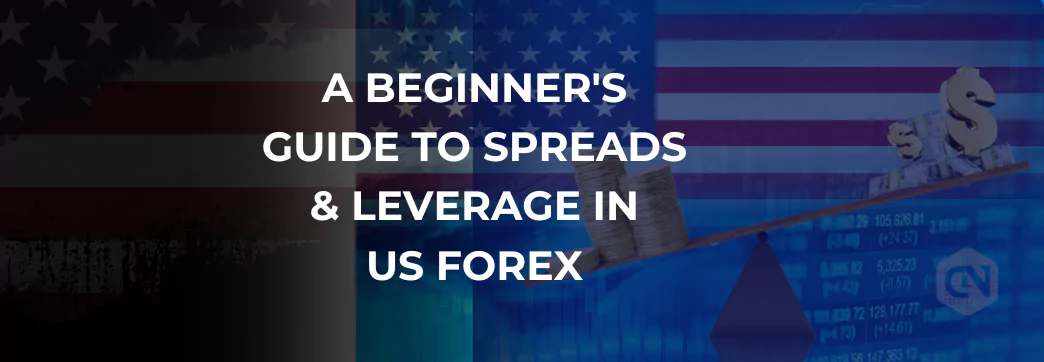Foreign exchange (forex) trading refers to buying one currency in exchange for another in the foreign exchange market. It is the biggest market for financial assets, where trillions change hands daily. In this case, spreads and leverage in US Forex are important to beginners. Spreads reflect the price of trading, basically bid and offer prices.
Reducing the spread implies reducing the cost. Leverage means that US forex traders can trade with more significant positions than their account balance. It is a useful tool for increasing gains but also poses a lot of risk. Forex trading in the US is well-regulated and safe for traders.
Understanding Spreads
A spread in forex trading refers to the gap between the buying price, also known as the asking price, and the selling price, or the bid price of a currency pair. It shows the cost of trading within the firms. Spreads are quoted in pips, the standard unit of price measurement in the foreign exchange market.
Fixed spreads are fixed at a certain level irrespective of the market forces of demand and supply. They are safe for new players since they guarantee regular and predictable winnings. Variable spreads change their value depending on the market conditions.
A number of factors help to determine the spreads evident in the US market, as depicted below.
- Economic Data Releases: Large events, such as GDP releases or employment statistics, may lead to fluctuations in price movements, affecting spreads.
- Federal Reserve Announcements: The Federal Reserve’s actions, such as decisions on interest rates or monetary policy, can shift the market and influence spreads.
- Market Liquidity: As a rule, higher liquidity leads to a decrease in the spreads, whereas low liquidity contributes to an increase in them.
In this case, the spreads vary depending on the brokers used. For instance, Forex.com offers competitive spreads, which are sometimes tighter than those offered by other brokers. IG provides both fixed and floating spreads, suitable for every trading style.
What is Leverage?
Leverage in forex trading means a trader can make larger trades with less money. It is an effective tool that can amplify both profits and losses.
In the United States, two major regulatory bodies oversee forex trading: the Commodity Futures Trading Commission (CFTC) and the National Futures Association (NFA). Leverage is constrained to avoid traders taking too much risk. Common leverage ratios are 50:1 for the major pairs and 1:20 for the minors and exotics.
US brokers, like Forex. com and OANDA, typically offer forex leverage in US up to 50:1. The first is the lack of adequate capital to finance the project, and the second is the inability to access the right human capital.
- Scalping: Scalpers make many trades in the day or as many as possible within the trading day. High leverage is crucial in scalping as it increases the effect of price fluctuations, thus making the strategy feasible.
- Swing Trading: Swing traders, therefore, trade for a few days to a few weeks at most. Moderate leverage is useful in getting better returns on bigger price movements without a lot of risk.
- Position Trading: Position traders trade in the long-term horizon, where they may hold positions for months or years. They employ lower leverages and invest with a long-term perspective, and avoid short-term fluctuations.
Risks and Benefits of Leverage
Advertisement
Leverage magnifies purchasing clout; in other words, traders can command larger volumes with less capital. This can lead to higher profits from small market movements, making it an important tool for boosting returns.
Leverage also enhances the risk of earning losses since it amplifies the impact of the actual capital used in trading. In a leveraged position, the losses can easily surpass the initial investment if the market opens against the position.
To mitigate these risks, traders can scale down leverage to minimize the impact of such events. The use of stop-loss orders assists in avoiding additional losses, by closing the trades at specific levels.
The Role of the CFTC and NFA
The two major regulatory bodies of forex trading in the United States are the CFTC and the NFA, which stand for Commodity Futures Trading Commission and National Futures Association, respectively. The CFTC enforces laws that govern the markets, and the NFA regulates the lowest spread forex broker in USA markets.
This is a way of protecting US traders by providing the necessary measures to guarantee that forex transactions are transparent, fair, and secure. It deters fraud and abuse and ensures people are held accountable for their actions.
Leverage limits and spreads are two areas that will be affected by the proposed regulation.
The CFTC and NFA regulate leverage limits (e.g., 50:1 for major pairs) to keep risks under control. They also regulate the best forex spread in the US by requiring brokers to offer their clients competitive and non-manipulative prices.
How to Choose the Right Broker
Trading online includes significant financial risk, therefore choosing a safe and trusted broker is tough. Check for a broker who is regulated by reputable authorities like the Securities and Exchange Commission (SEC) or the Financial Industry Regulatory Authority (FINRA) in the US.
These regulatory agencies impose tight criteria to protect investors, including minimum capital requirements, fraud insurance, and fair dealing norms.
While selecting your broker, consider the spreads, forex leverage in US for beginners, trading platforms, and customer service. Low spreads help to cut trading costs, and the leverage levels are appropriate depending on the trader’s risk appetite.
To know whether a broker is genuine, one must determine whether the broker is registered with the CFTC and a member of the NFA. To be sure of the current status of the NFA and to read through any sanctions, one should visit the organization’s website.
Few Tips for Beginners
- Start with a Demo Account: Trading simulations to learn about trading platforms and strategies without exposure to live funds.
- Understand and Manage Risk: Lower leverage should be used, and traders should never risk more than they can lose.
- Use Stop-Loss Orders: Protect your investments by setting stop-loss orders.
- Stay Informed: This can be done by following the movements of the market and other trends that may be present in the market.
Conclusion
Advertisement
Leverage and spread are some of the most important concepts in forex trading that should be fully understood by any trader. Spread impacts the cost of trading, while leverage increases both profits and losses. Understanding these concepts assists traders in making the right decisions, minimizing risks, and maximizing the effectiveness of their trading strategies.
Traders need to be constant learners and engage in responsible trading. They should open demo accounts for practice, follow market trends, and apply measures such as stop-losses. Education and discipline are the two key factors that can help traders avoid getting into the wrong side of the forex market and gain more profits in the long run.
Ready to take the next step in your trading journey? Explore our list of top forex trading platforms in USA, and find the one that suits your trading needs.

